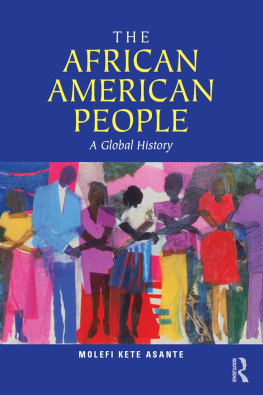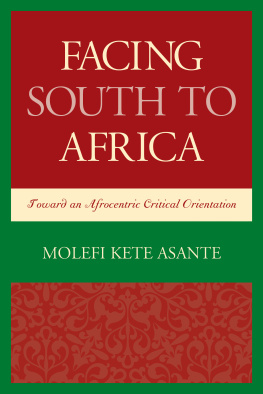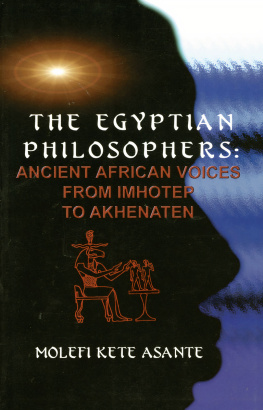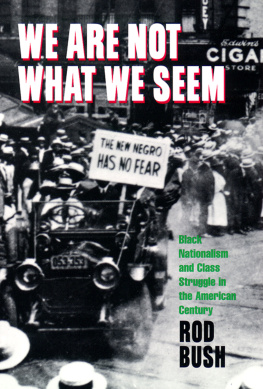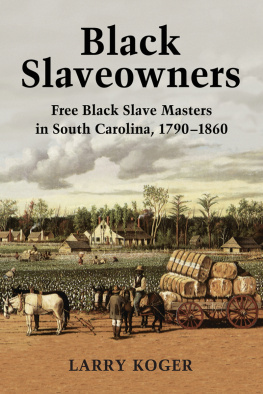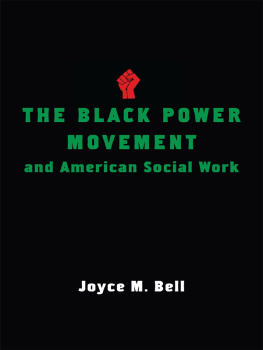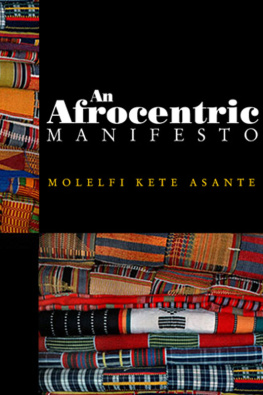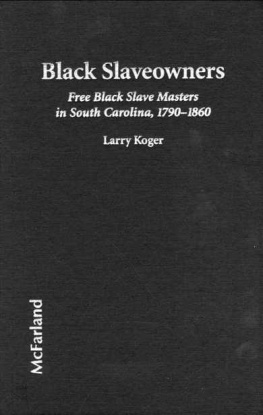First published 2011 by Paradigm Publishers
Published 2016 by Routledge
2 Park Square, Milton Park, Abingdon, Oxon OX14 4RN
711 Third Avenue, New York, NY 10017, USA
Routledge is an imprint of the Taylor & Francis Group, an informa business
Copyright 2011, Taylor & Francis.
All rights reserved. No part of this book may be reprinted or reproduced or utilised in any form or by any electronic, mechanical, or other means, now known or hereafter invented, including photocopying and recording, or in any information storage or retrieval system, without permission in writing from the publishers.
Notice:
Product or corporate names may be trademarks or registered trademarks, and are used only for identification and explanation without intent to infringe.
Library of Congress Cataloging-in-Publication Data
Asante, Molefi K., 1942
Rooming in the masters house : Power and Privilege in the Rise of Black Conservatism / Molefi K. Asante, Ronald E. Hall.
p. cm.
Includes bibliographical references and index.
ISBN 978-1-59451-890-4 (hardcover : alk. paper) ISBN 978-1-59451-891-1 (pbk. : alk. paper)
1. African AmericansPolitics and government. 2. ConservatismUnited States. 3. SlaveryUnited StatesHistory. 4. African AmericansHistory. 5. African AmericansSocial conditions. 6. African AmericansIntellectual life. 7. United StatesRace relationsPolitical aspects. 8. United StatesPolitics and government. I. Hall, Ronald E. II. Title.
E185.A82 2010
323.1196073dc22
2010015512
Designed and Typeset by Straight Creek Bookmakers.
ISBN 13 : 978-1-59451-890-4 (hbk)
ISBN 13 : 978-1-59451-891-1 (pbk)
Contents
Chapter One
Slave Psychology: The Shape of Race Relations
Chapter Two
Field Negroes and House Negroes
Chapter Three
House Negroes and the Crisis of Identity
Chapter Four
The Conservative Political Agenda
Chapter Five
Self-Mutilation in the Masters House
Chapter Six
Extending the Metaphors: Conservatives and Liberals
Preface
Since the 2008 election of President Barack Obama, there has been a great rush to explain the nature of the African American political community. However, in the years leading up to his election by a progressive coalition of Americans supporting an agenda of change, black conservatives asserted one of the principal narratives opposing Obamas presidency: fear of his idea of black entitlements. Black conservatives represent a vocal minority within the Republican Party, although all black Republicans are not conservatives. Issues like rugged individualism, states rights, American military supremacy, anti-abortion, gun rights, and unfettered capitalism have galvanized the dyed-in-the-wool black conservatives. For all practical purposes, these blacks are in the same tradition as conservative whites in the United States who have advanced the idea of the individual over the common good, American national exceptionalism among states, and unregulated capitalism. Michael Steele, for example, was elected the first black to chair the Republican National Committee right after the nation had chosen Obama as president, but he proclaimed the same exceptionalism as the white conservatives and made almost no outreach to the masses of African Americans. Furthermore, Steele, who has had a fiery, controversial, and agitative tenure since becoming the leader of the Republican National Committee in January 2009, also served as Lieutenant Governor of Marylandthe first African American elected to statewide office in the stateand chairman of the GOPAC, the Republicans training and fundraising group. But it was as a commentator for Fox News that Steele showed his marbles, so to speak, to the Republicans as one who could out-Republican the most dyed-in-the-wool white conservative. Like Steele, most black conservatives share most of the attitudes of the white conservatives. Black conservatives have often articulated a nationalism that borders on jingoism and claimed special knowledge about the causes of poverty, inadequate health care, and poor education in some black communities. As such, they are the authentic sustainers of the status quo, however unequal, imprecise, and anti-African that status quo happens to be. Malcolm X had a term for them: house Negroes.
The term house Negro had its source in the separation of Africans from one another in an effort to maintain a duality in the plantation system of work and responsibility between the enslaved who worked in the fields and shops and those who were trusted enough to work in the masters house. During the enslavement, those Africans who were chosen to work in the big house, close to the white family, in time may have also been distinguished from those who worked in the fields by the lightness of their skin color. From the beginning of the African enslavement in America, white slave traders and slaveholders had complete access to enslaved females, who then produced children who struggled with their identities. They could easily see that in a mass of black faces, theirs was not nearly as black and indicated the presence of white paternity. This was an observable fact among the enslaved, as portrayed in Haile Gerimas famous film, Sankofa, but as we shall see, there were blacks produced from these liaisons for whom their status as descendants of rapists motivated them to fight slavery, oppose discrimination, and rebel against the prevailing social and political structure. Alas, however, most descendants of black women and white slaveholders did not follow this route during the early days of the enslavement. They were co-opted, so to speak, by the blandishments of racial hierarchy that promised them a better enslavement if they served the interests of the masterswho were often their fathers. They became good converts to the mentality of other house Negroes. Thus, separation from the masses was the key ingredient in the mixed messages of slavery and identity for the house Negro. By being separated from the masses, or the field Negroes, the house Negro developed a sense of being special, acceptable, and different from the collective masses of his own people; indeed, he was often embarrassed by the behavior, thinking, and beliefs of the field Negroes. The house Negros relationship with the black collective weakened to the degree that he adopted the submissive and aggrandizing behaviors that made him useful to the white slave masters.
Thus, the house Negro was socialized in a different way than other blacks. He was often given trinkets, such as glass jars and pieces of silk, to memorialize the difference between himself and his community. At certain points, the house Negro became identified in the minds of other blacks with what could happen to blacks mentally when they submitted to the perils of human bondage and embraced the political and psychological directives of the dominant white power structure. Those directives, policies, rules, and privileges became, for the house Negro, manifested as white superiority. To him, they made it clear that everything the white slave owner did should be considered good, worthy of emulation, and legitimate. What the African did, on the contrary, should be seen as bad, incorrect, and derivative. The house Negro, then, believed in white supremacy almost as much as the white man believed in it. The social and political structure of slavery contrived this belief in white superiority in order to justify the European Slave Trade and the ensuing subjugation of Africans who reached the Americas bound in chains. However, these justifications were not enough to prevent the house Negro from believing in the ultimate power of white supremacy. Yet neither brutality nor bondage prevented house Negroes from casting their lots with whites; in most cases, no amount of hostility from the white plantation owners changed house Negroes affection for their position with the white masters. Sometimes the house Negros arguments were as anti-African as those of the white slave owner. The house Negro was an apologist for every cruel deed inflicted against progressive, self-respecting, and rebellious Africans. When Africans sought to escape from the plantation, they had to ensure that their plans would not get to the ears of the house Negro because, on more than one occasion, the house Negro was the instrument of death. Seeking methods to frustrate the interest of black people and serve the interest of the white slave master, to insinuate themselves into what they considered to be the good graces of the white master, became the constant task of the house Negro. The house Negroes named their children after the master. If the masters daughter were named Madison, Kennedy, Taylor, Ryan, or Wilson, then the house Negro would give his daughter the same name. He would ridicule the field Negroes for choosing jungle names when they gave their children African or African-derived names like Kiamuya, Eka, Tobolayefa, Tamieka, Shanika, Tamu, Fatou, Ama, Ayaana, or Akua. In contemporary times, the black conservatives often refer to African names as ghetto when a person expresses pride in her or his African culture and heritage. The house Negro might say, Anyone can tell when she hears that name that the person is black, in the same way that one knows that a name such as Ogawa, Morikawa, Miike, or Suzuko is that of someone who is Japanese. What is wrong with people knowing that your name reflects your history and culture? Of course, nothing is wrong with this except that the house Negro sees these African names as being disloyal to the white slave master.


